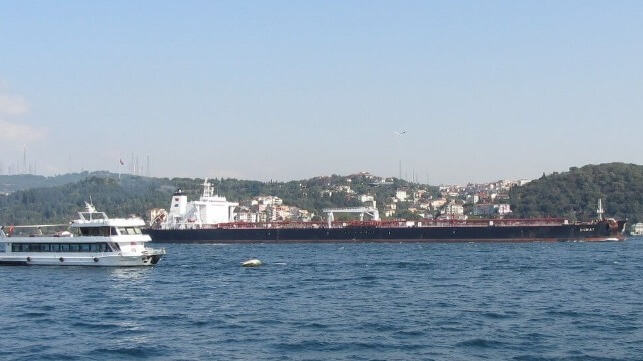New Turkish Insurance Rules Hold Up Kazakh Oil Shipping
Aiming at coverage for Russian vessels, Turkish insurance-guarantee requirement hits Kazakh exports instead

When Turkey implemented a new rule to ensure that Russian tankers are properly insured before transiting the Bosporus, it likely did not anticipate that it would create a bottleneck for Kazakh oil exports. But a traffic jam has indeed built up on both sides of the strait as officials wrangle over the details of adequate proof of insurance, working out a format that is both adequate for Turkey's concerns and acceptable to IG P&I clubs.
At present, 19 tankers are moored at either end of the narrow channel and awaiting permission to transit. The majority are laden with Kazakh oil, brokers told Bloomberg. Kazakhstan does not have a direct connection with the sea, so its seaborne oil exports are piped over the border and loaded at a terminal in Novorossiysk, Russia.
Tankers are already required to carry a "blue card," an IMO-standard certificate proving marine insurance, and local officials can verify it using an online service. In addition to this existing proof of cover, Turkey now requires a letter from the insurer declaring that the coverage is valid for a specific voyage through the Bosporus.
P&I clubs have objected to the requirements of the letter. According to Gard, the largest P&I insurer, Turkey's new rules require a guarantee that "cover will remain in place under any circumstances" while the vessel is in Turkish waters. This is a sweeping requirement, and it overrules insurers' own exclusion clauses for material issues involving the ship - like sanctions breaches. EU, UK and U.S. laws forbid insurers from providing cover to certain vessels and oil cargoes; a letter of promise to provide cover even for vessels which turn out to be sanctioned "would expose the club to a breach of sanctions," according to Gard.
Turkey's new requirements are intended to address concerns about uninsured Russian vessels. On December 5, the EU and the UK banned their marine insurers - who hold 95 percent of the world's P&I market - from covering Russian oil cargoes. There is an exception for oil cargoes priced beneath $60 per barrel, but Russia has pledged not to cooperate with this limit.
The price cap will leave some Russia-serving tanker operators dependent on alternate sources of insurance, which may or may not have the financial robustness of the dominant Western P&I players. Russian tankers can access their own domestic insurance through a non-IG member insurer, the Ingosstrakh Insurance Company, with reinsurance through the Russian National Reinsurance Company (RNRC). Their capacity and political willingness to pay in the event of a major casualty is not known.
Turkey's insurance requirements are intended to address this issue, and the International Group is in talks with Turkish officials to find a middle ground. The U.S. Treasury has also engaged in conversations with Turkish authorities in an attempt to resolve the issue, according to the FT.
